Understanding the vehicle inspection requirements in Georgia can feel overwhelming, but it doesn’t have to be. In Georgia, your car must pass both emissions and safety inspections before it can be registered, renewed, or sold. These checks ensure your vehicle is safe for you and others on the road.
If your car fails the inspection, don’t worry—there are clear steps you can take to address the issues. Learn what to do to navigate these requirements easily.
General Overview of Georgia Vehicle Inspection
In Georgia, vehicle inspections ensure that vehicles meet safety and emissions standards. This process helps in maintaining road safety and reducing environmental impact.
Importance of Vehicle Inspection
Vehicle inspections play a crucial role in road safety. Inspectors check systems like brakes, tires, and safety belts to make sure your vehicle is safe to drive. Faulty equipment can lead to accidents, so these checks are essential.
Emissions testing is also vital. It aims to reduce air pollution by ensuring that your vehicle meets emission standards. This is particularly important in urban areas where air quality can be a concern.
Benefits:
- Safety: Prevents accidents.
- Environment: Reduces air pollution.
- Compliance: Meets legal requirements.
Basic Requirements for All Vehicles
Each year, your car needs a vehicle inspection. This includes checking the safety features and emissions testing. You have to get this done before your vehicle registration or renewal.
- Safety Inspection: Checks brakes, tires, lights, and safety belts.
- Emissions Testing: Required for gasoline-powered vehicles from the year 2000 and newer.
- Exemptions: Vehicles like diesel-powered cars and cars over 25 years old are exempt from emissions testing. You can find more details about these exemptions on the DMV website.
Make sure to complete these inspections to avoid penalties and keep your vehicle in good shape.
Emissions Testing in Georgia
In Georgia, emissions testing is essential for ensuring vehicles meet environmental standards. It helps improve air quality by identifying vehicles that emit excessive pollutants. Here’s what you need to know:
Vehicles Subject to Emissions Testing
Certain vehicles in Georgia must undergo emissions testing. If your car is gasoline-powered with a model year from 2000 to 2021, it needs to be tested. Light-duty trucks over 8,500 lbs also fall under this requirement.
Diesel vehicles and those that are over 25 model years old are usually exempt. Newer cars, especially those manufactured in 2015 or later, might also be exempt. For more specifics, you can refer to the Georgia Clean Air Force.
Emissions Testing Process
The emissions testing process involves several steps to ensure your vehicle is compliant. First, there’s an On-Board Diagnostics (OBD) test. This checks the vehicle’s emissions control performance history.
Next is the fuel cap inspection, which ensures the fuel cap seals properly to prevent vapors from leaking. Finally, a visual inspection of the catalytic converter ensures it hasn’t been tampered with or removed.
Understanding Emissions Test Results
After your vehicle goes through emissions testing, you’ll receive the test results. The results will show if your vehicle passed or failed the inspection. If it passes, you can use the vehicle inspection report (VIR) for registration purposes.
If your vehicle fails, you’ll need to make necessary repairs to meet state requirements and pass a retest. Keep your test results handy for reference during repairs. The Georgia Clean Air Force offers resources and a “RepairWatch Public Report” of repair shops that specialize in emissions-related fixes.
Inspection Exemptions and Extensions
Certain vehicles in Georgia can qualify for exemptions from emissions testing or receive an extension. Understanding these can help you stay compliant with state regulations and potentially save time and money.
Criteria for Exemption
You may be exempt from emissions testing based on specific criteria. Newer vehicles, which are three model years old or newer, do not need an emissions inspection. For instance, in 2024, vehicles from 2022 or newer are exempt from emissions testing. Similarly, if you own an antique or collector vehicle that is 25 model years old or older, it will not require an emissions test. For 2024, this means vehicles from 1999 and older will be exempt.
Certain vehicle types are also exempt. Motorcycles, recreational vehicles, and diesel-powered vehicles are not required to undergo emissions tests. Some examples include RVs and motorcycles, which are naturally exempt due to their design and usage.
Procedure for Obtaining an Extension
If your vehicle is out of the metro Atlanta area, you can apply for an Out-of-Area Extension. This extension is valid for up to one year. Every year, before your vehicle registration renewal date, you must reapply for the extension. Once you return to the metro Atlanta area, your vehicle must pass an emissions inspection.
To apply for an extension, submit your application online or via email. You’ll need to contact Georgia’s Clean Air Force and provide your vehicle identification number (VIN) and license plate number. For more details, you can refer to Georgia’s Clean Air Force on Out-of-Area Extensions. If you have any questions, you can call 1.800.449.2471 for help.
Alternative Fuel and Hybrid Vehicles
If you own an alternative fuel vehicle or a hybrid vehicle in Georgia, it’s important to know about specific guidelines and benefits. These details can help you with legal compliance and maximize your benefits.
Inspection Guidelines for AFVs
In Georgia, certain rules apply to alternative fuel vehicles (AFVs), including hybrid vehicles. AFVs running on electricity, propane, or natural gas don’t need an emissions test, unlike gasoline-powered vehicles. This is great because it means less hassle for you.
However, it’s essential to keep your vehicle’s emission systems in good shape. Battery electricity-powered vehicles, for example, should have their batteries regularly checked to ensure proper functioning. If you have a bi-fueled or dedicated alternative fueled vehicle, you might want to confirm specific requirements with Georgia’s Clean Air Force guidelines.
Registration and Benefits for AFVs
When you register your AFV, be aware of some fees and perks. For instance, you are subject to an annual license fee, which varies each year. This fee is based on the average motor vehicle fuel efficiency in the U.S.
You also have to pay a one-time manufacturing fee of $25 and an annual $20 registration fee, plus a $35 special tag fee if you opt for an alternative fuel vehicle license plate. Benefits of owning one include potential income tax credits. This makes it more affordable and encourages the use of cleaner energy sources like hydrogen or natural gas.
Understanding Vehicle Identification
Vehicle identification is crucial for tracking, registering, and verifying your vehicle. It helps in ensuring that the vehicle meets all regulations and certifications set by authorities.
VIN and Its Importance
The Vehicle Identification Number (VIN) is a unique 17-character code assigned to every vehicle by the manufacturer. The VIN provides information about the vehicle’s make, model, production year, and place of manufacture.
You’ll usually find the VIN on the dashboard near the windshield, on the driver’s side door frame, or inside the engine compartment.
Understanding your VIN is key for several reasons. It helps confirm the vehicle’s identity, which is important when registering, selling, or insuring your car. It also plays a role in tracking recalls and warranty claims.
Moreover, when shopping for auto parts, the VIN can help you find the right components that will fit your specific vehicle model. This ensures that you are using compatible and safe parts.
Motorcycles and Recreational Vehicles
In Georgia, motorcycles and RVs have specific inspection rules you need to know. Understanding these rules ensures that your vehicle complies with state regulations.
Inspection Essentials for Motorcycles
In Georgia, motorcycles are exempt from emissions testing. This means you do not need to worry about annual emissions checks for your bike. Instead, focus on the basics to keep your motorcycle in good shape.
Regularly inspect your brakes, lights, and tires. Make sure your headlights and turn signals are working properly. Also, check your tires for wear and tear and ensure your brakes function well. These steps help maintain safety and performance.
RVs and Emissions Testing
RVs, including motor homes, are also exempt from emissions testing in Georgia. You can register your RV without needing to pass an emissions test. However, maintaining your RV is still crucial.
Check the condition of your engine, brakes, and tires before long trips. Test all lights and safety devices. Regular maintenance not only keeps your RV roadworthy but can also prevent breakdowns during your travels.
By following these steps, you ensure that both your motorcycle and RV meet Georgia’s vehicle inspection requirements, giving you peace of mind and a smooth ride.
Preparing for Vehicle Inspection
To ensure a smooth vehicle inspection in Georgia, it is essential to check key components such as brakes, lights, and the engine beforehand. Focusing on these areas helps you avoid common pitfalls that could lead to inspection failure.
Pre-Trip Inspection Checklist
Before you start your trip to the inspection station, conduct a thorough inspection of your vehicle. This will help you catch any issues early. Here’s what to check:
- Belts and Brakes: Ensure all belts are tight and in good condition. Brakes should be responsive, and there should be no unusual noise.
- Leaks: Look for fluid leaks under the vehicle. Check for oil, coolant, and brake fluid leaks.
- Gauges: Verify the readings on your gauges. Air pressure should build from 50 to 90 psi within 3 minutes. The ammeter and voltmeter should be in the normal range.
- Lights: Inspect all lights including headlights, turn signals, and the dimmer switch. Ensure that all are functioning properly.
- Engine Compartment: Open the hood and inspect the engine compartment. Look for worn hoses and electrical wiring issues.
- Windshield Wipers: Ensure your windshield wipers are working effectively.
- Emergency Equipment: Make sure you have a fire extinguisher, reflectors, and other emergency equipment.
Common Reasons for Inspection Failure
Understanding common reasons for inspection failure can help you avoid them:
- Faulty Brakes: Your air brakes should be operational, and your service brake must work properly. Any issue here can lead to failure.
- Lights Issues: Non-functional headlights, turn signals, or parking lights can cause you to fail the inspection.
- Leaks: Presence of leaks, especially brake fluid or coolant, is a common reason for rejection.
- Gauge Malfunctions: If your gauges like the ammeter or voltmeter are not showing normal ranges, this might be a problem.
- Parking Brake: Make sure your parking brake holds the vehicle stationary even on an incline.
- Safety Belts: Ensure that all safety belts are working and not frayed or damaged.
- Electrical Problems: Issues with electrical wiring can lead to inspection failure. All connections should be secure and without corrosion.
By following these steps and paying attention to these common failure points, you can improve your chances of passing your vehicle inspection easily.
Waivers and Compliance Issues
In Georgia, certain vehicles may qualify for waivers from emissions inspections under specific circumstances. Additionally, knowing the penalties for non-compliance with inspection requirements is crucial to avoid fines and legal trouble.
Obtaining a Repair Waiver
If your vehicle fails the emissions test, you may be eligible for a repair waiver if the cost of the necessary repairs exceeds a certain amount. You will need to provide detailed receipts and documents showing the attempts at repair. Contact Georgia’s Clean Air Force at 1.800.449.2471 with your vehicle identification number (VIN) and license plate number for more assistance.
To qualify, repairs must be conducted by a certified mechanic, and all related expenses should meet the minimum spend requirement set by the state. If you meet these conditions, you can apply for a waiver, allowing you to renew your vehicle registration without passing the inspection, but keep in mind it is typically valid for a limited time.
Violations and Penalties
Not complying with Georgia’s vehicle inspection requirements can lead to penalties. If you drive without a valid emissions test in applicable counties, you may face fines and registration issues. Your registration may be put on hold, preventing you from legally driving your car.
Violations can also lead to increased fines on your vehicle registration renewal, making it more expensive and complicated to resolve. Repeat offenses can lead to even harsher penalties, so it’s important to stay compliant by getting your vehicle tested on time or applying for applicable waivers.
Through understanding these rules, you can stay on the right side of the law and avoid unnecessary penalties.
Registration and Renewal Process
Registering and renewing your vehicle registration in Georgia involves a few key steps, whether you are a new resident or updating an existing vehicle. Understanding the processes can help you stay compliant and avoid any penalties.
Steps to Register Your Vehicle
If you’re a new Georgia resident or purchasing a vehicle, you must register it within 30 days. Start by visiting your local County Tag Office. Bring necessary documents like proof of ownership, an emission test certificate (if required), and proof of Georgia insurance.
Fill out the title application and pay the registration fee. You may need to provide additional identification.
After submitting your documents and payment, you’ll receive your Georgia license plate and registration card.
Renewing Vehicle Registration
You can renew your vehicle’s registration online, in person, by mail, or at a self-serve kiosk.
Renewing online is simplest. Visit the Georgia DRIVES e-Services website, where you’ll need your license plate number and either your driver’s license number or the last four digits of your VIN.
Make sure your registration date is current, and you have your emission test (if required). Fees are usually payable via credit card.
If renewing by mail, include the renewal notice, payment, and emission certificate, if applicable.
In-person renewal requires a visit to your County Tag Office. Bring your renewal notice, driver’s license, and payment. Using the MVD self-serve kiosks in some locations can also save time.
Following these steps ensures your vehicle remains legally registered and can help avoid late fees or penalties.
Special Considerations for Specific Vehicle Types
Different types of vehicles in Georgia might have extra inspection requirements or benefits. It’s essential to know what applies to your vehicle to stay compliant and enjoy any perks available.
Trucks and Heavy Vehicles
If you own a truck or any heavy vehicle, you need to pay special attention to the Gross Vehicle Weight Rating (GVWR). Vehicles with a GVWR over 8,500 pounds have more stringent inspection requirements. For example, you must ensure that your vehicle’s ammeters and voltmeters are within the normal range, and the coolant temperature should gradually rise to the normal operating range during inspection.
Also, a thorough walk-around inspection is a must. Check that all external lights, such as low beams, high beams, four-way flashers, and parking lights, are working correctly. This includes ensuring that your side-marker and identification lights are also in working order. These steps help ensure safety for everyone on the road, whether you’re carrying cargo or people.
Benefits for Low Emission Vehicles
Low emission vehicles enjoy several benefits when it comes to inspections in Georgia. If your vehicle is a gasoline-powered car made in the year 2000 or newer and is categorized as light-duty, you’re required to undergo smog checks. However, if your vehicle is three years old or newer, you are exempt from this requirement.
This exemption helps both the environment and your wallet. By choosing a low emission vehicle, you contribute to cleaner air and fewer pollutants. Plus, you save on the time and money it takes to complete these inspections. Keeping your vehicle within the emission limits not only benefits you but also supports Georgia’s environmental goals.















